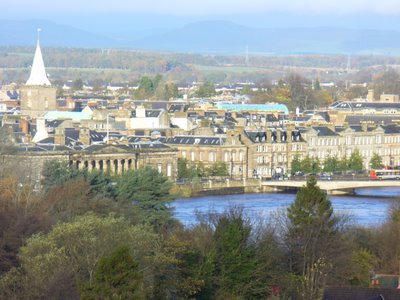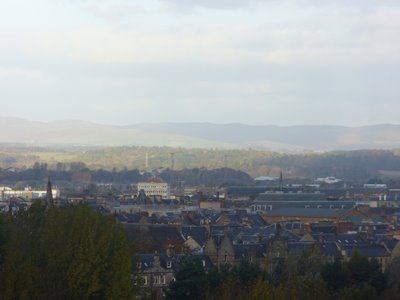
If all goes to plan (ie I somehow manage to pass all my exams, essays etc) this will be my last winter commuting from Perth to college in Glasgow. Having studied for about five years, part-time, in order to achieve an 'umble ordinary degree, it's hard to imagine not having college as part of my life.
Although I will greatly miss the intellectual and spiritual stimulation of college, as well as the fruit gained from having the discipline of deadlines imposed upon my reading habits, there's something else I will miss - freezing cold winter mornings at Perth station. Very early in the morning, at either 6:55 or 7:12, clusters of freezing bodies huddle under the platform canopies, lost under coats and scarves. Heavy clouds of exhaled steam hang thickly around them in the damp morning air, while the smokers amongst them gasp their last intake of nicotine before the hour and half journey. Their hot stinking breath rises fast and lingers around the lights in the canopy rafters, columns of pollution reminiscent of the great Victorian railway engines this vast station was built to serve.
Perth boasts a station which is bizarely disproportionate for its needs, despite the massive down-sizing it has endured over recent decades. Once the centre of vast tangles of sidings and engine sheds, it was the hub of much of Scotlands network of rural railway lines, as well as the end of the North British mainline north from Edinburgh. It took part in the "race to the North" as part of the last stage in the East and West Coast mainlines attempts to achieve prominence from London to Aberdeen, and had Queen Victoria as a frequent visitor, her train often stabled on the "Royal Platform" enroute from London to Balmoral. In later days it formed one of British Rail's regional centres from which a vast area of track and train movements were organised. It was said that at Perth, where six lines met, there was never not a train in motion. It was certainly a bottle neck for rail traffic which caused signalmen no end of testing and passengers numerous delays.
Today the place is strangely silent, few trains, few passangers, few staff. The group gathering on platform one, let out a collective groan when the muffled tannoy echoes out Scotrail's apology for the late-running 7:12 service to Glasgow. This, they are helpfully informed, is due to a late-running preceeding train; an announcement as meaningless as it is insincere. Meaningless because it given them no information of any use, and insincere because they all know that Scotrail will get compensation from Network Rail for the delay - none of which will reach the pockets of the travellers on platform one. Icy cold hands dip into pockets and fumble with mobile phones, and messages are left apologising for missed apointments.
The place though, bleak, rusting, and windswept as it is, I find charming -especially very early in the morning. The place is positively oozing with history. It's not just the soot from a thousand steam engines, clinging to pillars high above the platforms, nor is the poignant memorials to railwaymen lost in wars, nor is the merely the thought that when this station was great, it was part of what made this country significant. It's also that in the half-light of the early morning (especially at 5:40am when the London sleeper arrives) if you close half-close your eyes, you can almost see the place as it was.
At squint down platform seven will see an old engine pulling trucks loaded with potatos coming down from Bankfoot. Platform three is a hive of activity as men from the Tay fisheries load hundreds of salmon and great chunks of ice into blocks. Towers of smoke rise from the west where train loads of whisky come to and from the bond, while Edwardian bobbies march uniformed prisoners from coaches towards their new accomodation at "Number One, Edinburgh Road". Coaches from Inverness are marshalled for London, Oban, Bristol, Manchester and Carlisle and under the vast canopy at the North of the station, the volunteers of the "Perth Patriotic Barrow" sign up young men to give their lives for King and Country on the western front. Then I'm sure I saw my grandparents, driving off the motorail train from London on platform five, heading for a holiday in the Highlands in a mustard yellow Austin 1100.
"The train new approaching platform is the late running 7:12 service to Glasgow Queen Street". The tannoy rudely interupts my mental time-travelling, the world comes back into focus and the proud Victorian ironwork gains a century of rust, shrubs sprout from long-neglected gutters, sidings dissappear under forests of weeds, and a shiny, quiet, brand-new train glides effortlessly into the platform. We used to have uncomfortable trains and gleaming stations, now we have gleaming trains and uncomfortable stations. Progress no doubt.
This might be my last winter waiting on platform one for the early train. I'll miss it.












